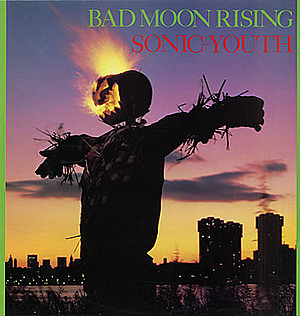My mind it ain’t so open
Mon. May 4, 2009Categories: Abstract Dynamics
 |  |
I’m glad someone called me on the deliberately provocative, “boldly counter-intuitive and funny … elision of Sonic Youth with Primal Scream and Oasis” in my review of the dreadful Brand Neu! ‘tribute’ album in The Wire 303. I’m particularly glad that the one doing the calling was ZoneStyxTravelcard (who is aka one of The Wire‘s best writers, but I’ll keep quiet about his meatworld ID as I’m not sure if he wants it to be outed yet…) (Incidentally, there are some interesting convergences between what I said in the Brand Neu! review and Simon’s recent
When I said above that the judgement on Sonic Youth was deliberately provocative, I didnt mean it was false. I realised when I wrote the review that dating the start of the fall from grace so early – with Bad Moon Rising rather than the obviously formulaic later phase certainly consolidated by the time of Goo – was risky. But Zone… has managed what, for the last twenty years has been all but impossible, and sparked my interest in Sonic Youth again. Who could not be beguiled by this description of Bad Moon Rising?
- BMR is the point at which their tunings, atonal and droning, blossom into dazzling synaesthetic iridescences. They sound, literally, uncanny with strings tuned to the same note but fractionally apart, they create their own doubles, an unheimlich shadow sound, like a transparent overlay just out of position. Playing Stoogoid riffery in a harmonic template borrowed from free jazz and serialism, one that smashes the overdetermined limits of the pentatonic, they make discord sensual in previously unheard ways. Alex Ross may take issue with this, but I think BMR is the point where Sonic Youth in effect reconnect discord with the body, restoring to it a libidinal force which you hear in The Rites of Spring, but which the cold geometries of Schoenberg and Webern subsequently evacuated.
This, plus Zone’s elaboration of the brilliant concept of “pyschopathology of place” further in the post, is precisely how I wanted to hear Bad Moon Rising, but never quite could, even then. And listening to it again this week, it sounds if anything even weaker than I remember it. The voices of Moore and Gordon have always blocked my enjoyment of Sonic Youth; even when the music achieves the oneiric uncanniness described by Zone, the spell is broken by Moore’s hipster-slacker drivel or Gordon’s hectoring shout. But it was the fact that they could once have claimed to have been a continuation of postpunk’s popular experimentalism that allowed their retro-necro reverence and referencing to have such force. SY had enough credibility to legitimate the turn to the rearview mirror – the likes of Primal Scream and Oasis, who have never been original or groundbreaking, could then follow in their wake. On Bad Moon Rising, as Zone rightly argues, it isn’t the music so much as the tissue of references that is backward looking. Except of course for that distorted sample of The Stooges “Not Right” at the start of “I Love Her All The Time” – and you could argue that the whole of the last 25 years conversion of experimental rock into part of the heritage industry (culminating in the grotesque return of The Stooges themselves as geriatric teenagers, the All Tomorrow’s Parties retrofests, everything so consummately lambasted in Tony Herrington’s review of The Stooges’ The Weirdness in The Wire a couple of years back) was bred out of that one act of citation. Not so much kill your idols, as put them on the festival circuit, forever. At this point, the postpunk and No Wave scorched earth intolerance for the past was gradually dismissed in favour of a widening of taste, a greater openness – hey, The Carpenters can be cool! cf the Immaculate Comsumptives’ roughly contemporaneous turn to MOR. I’d be the very last person to dispute the profound greatness of The Carpenters, but there’s a massive difference between being a person of good taste and being a great artist. As Nietzsche rightly argued, a certain kind of stupidity is necessary for all greatness, a preconditon for which is a deliberate narrowing of perspective, a refusal of ‘well-roundedness’.
The same issue came up at the recent Roundhouse event celebrating the publication of Simon’s Totally Wired a couple of months ago. Viv Albertine and Scritti’s Tom Morley had an attitude towards the strictures and the strictness of the (post)punk period that stopped just short of outright hostility: every aspect of your life was under scrutiny, Albertine complained, your clothes, your sexuality, what you said… But when the music was played, its crystalline ascesis, its lucid abrasion, showed that dogmatism can deliver intensity whereas laissez-faire well roundedness produces precisely the bleary retrospection of postmodern rock. You couldn’t admit to liking Neil Young, someone said – but that not being allowed to admit liking things, arbitrarily closing down aspects of the past even – no, especially – if they were ‘good’ was crucial to the drive to make something new.
It seems to me that Sonic Youth’s very long career has been based almost exclusively on their being “people of good taste” – curators, in other words, who can turn a notionally ignorant audience on to cool stuff. I think this is subtly but decisively different from being a portal: a portal is itself intensifying, there is a mutual process of libidinization between the portal and what it opens onto, whereas SY now derive practically all their credibility from gesturing to artists more marginal than them. (Also – portals function most powerfully when they are transversal connectors between different cultural domains, e.g. fiction and music – whereas many of SY’s references were to music, justifying the trend that will end up in mediocrities such as Starsailor parasiting credibility by association with great moments in rock history.) Ultimately, there’s something very uncomfortable about SY referring to the likes of Darby Crash while continuing on a thirty year, very stable, career as professional musicians and dilletantes. The problem isn’t quite that SY weren’t self-destructive fuck-ups as that they seem to be so pathologically well-adjusted that the music doesn’t appear to be performing any kind of sublimatory function for them. It isn’t that they “don’t mean it” so much as they only mean it, that, like the worst, most self-conscious meta-art, the work is reducible to a set of easily verbally explicable intentions. There is no sense, even in the early work as far as this listener is concerned, that the music is drawing on any unconscious material. (Improv and automatic writing are the worst ways to access the unconscious – discuss.) As Zone admits, like The Fall, SY have effectively pastiched themselves for the last two decades – and you have to ask: even if they were formally inventive in the first years of their existence , how can a group that is “combining and recombining previously-deployed moves into technically ‘new’ but very familiar shapes” be effectively differentiated from Status Quo? It’s not SY’s fault, for instance, that thelr (dreary and dreadful) cover of The Carpenters’ “Superstar” should be cited as the apogee of cool in the smuggest teen film of all time, Juno – it may not be their fault, but it is symptomatic, and it tells us a great deal about the way in which they – and the model of alternative rock that they are the poster boys/girls for – functions in the current reality programme. We’ve got a situation where the word ‘alternative’ has been entirely co-opted by the rock/youth model of rebellion – something interestingly attacked by Timothy Brennan in his Secular Devotion, which I also recently reviewed in The Wire; “capitalism is youth”, Brennan claims, in a beautifully provocative slogan. Rock is necessarily tied up with a romanticism of youth (whereas electronic music isn’t, in part because of its ‘cerebral’ nature, as Mike Banks observed when I interviewed him). The problem posed by SY not being “junky fuck-ups” is by no means unique to them – it is inherent to the whole mythology of rock, which is why the sheer survival of The Stones/ Who etc has fatally undermined rock as a mythology, enabling its conversion into mere entertainment. It hardly needs pointing out that if there is a mainstream now, it is alternative rock – not only the manifestly appalling mealy-conservatism of BritIndie, but also and especially, the ostensibly more experimental likes of Sonic Youth, which is now actually “experimental” in terms of brand identification, not in terms of any formal properties.